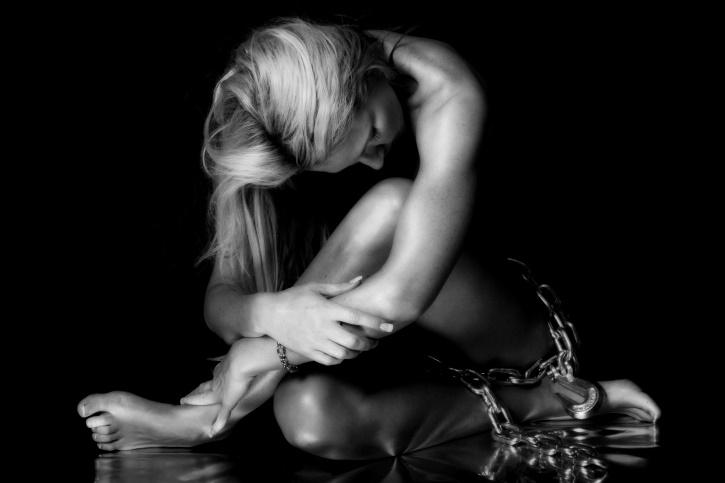
Credit: Thinkstock
Before we get started, I want to be vulnerable with you, and share something personal.
I have had erotic fantasies about rape, fatally sacrificing myself for a lover, being completely subservient to a male Dominant figure who beats me because he can (not in like, a caring way, but in an actual, "you're my property," abusive way), being fucked after I’m dead, being kidnapped and placed on a breeding farm, all sorts of pretty dark shit that’s taboo in society at large.
Most of these fantasies developed when I was very young, long before I had even kissed a boy, much less had sex with one. One of the first things I ever jerked off to was a piece where a woman zoo-keeper got raped by a gorilla (even though that’s ridiculous, gorillas have smaller penises than humans, but never mind).
So when I say I totally understand why people have these fantasies, I’m not joking. I really do understand.
But these fantasies did not occur in a vacuum. Fantasies rarely do.
Let’s break this down as it pertains to one of the most popular fantasies for women—rape fantasies. Somewhere between a third and half of women, depending on the study, fantasize about being raped. One study suggests that as many women find rape fantasies both erotic and aversive as ones who just find it erotic. We are compelled by it even as it terrifies us. That makes sense, when rape is a possibility for one in five women . . . perhaps more, if we consider how many go unreported, and how few that are reported end up in court. You’re more likely to get raped than get breast cancer. Perhaps that fear is morbidly fascinating?
I remember talking to a friend of mine about Grindr, just to open this up from heteronormativity. He was pointing out to me that it was a world of bottoms and no tops when it comes to rape fantasies. “It’s okay to want to be taken,” he said, “but to admit that you want to be the rapist? Who would do that? That’s creepy.”
Indeed, this is often the case with heterosexuals too—while it’s more and more normalized for women to admit to having fantasies where they are forced into sex, we are understandably wary of men who speak glibly about their desire to enact such fantasies. Maybe it’s because these fantasies can go horribly wrong, and when playing with consensual nonconsent, it feels frighteningly easy to cross the line between pleasing your partner through role play and actually being a rapist.
And let’s talk for a moment about what these rape fantasies tend to look like in these reports. In these fantasies, like in hentai (or in at least half of romance novels), a sexually desirable man is overcome with lust for a woman, so much so that he just HAS to have her. She protests, often because of modesty, but deep down she really wants it, wants him, and becomes overwhelmed with pleasure and sometimes love during the “rape.” The act being fantasized about, then, is not rape. Rape is an act of violence or coercion, often by someone known to the victim.
I don’t believe the fact that we call these rape fantasies—when it isn’t actually rape but perhaps ravishment—renders them harmless, however. It links the idea that rape is an act of sexual desire, and that women might actually want it or feel complimented by it. We live in a world where young girls who are raped are slut-shamed until they commit suicide.
How can we possibly say that these things are completely unrelated? And why, then, is media like 50 Shades of Grey so popular?
It’s reflective of years of subconscious training of women that admitting sexual desire is shameful and being “taken” allows you to avoid the blame, that the ideal partner is one who “just knows what’s best for you,” that “I’m yours, forever” is a romantic thing to say and not a terrifying admission of co-dependency. It’s because people are trained to believe that catcalling is a compliment rather than a power play, or that loving someone hard enough can transform them into someone better.
Tell me again how these things are just fantasies, and not conditioning under the patriarchy to help us deal with micro-aggressions and major trauma?
I’ve written about this before as it pertains to forced feminization, trans women being shut out of lesbian porn, fat fetishism, and our attraction/disgusted reaction to women seen as “manic pixies.” If you’ve followed me for any length of time, you’ve probably seen that I write and reflect on my own fantasies somewhat constantly—from Shredder’s knives to ageplay to creampies to sex on trains to wholesomeness. So I get it—even in my blog you’ll see me waver between “my cunt likes what it likes, leave it be” and “how has culture shaped and perhaps fucked up my sexuality?”
I understand this is an unpleasant discussion and will make you second guess yourself. But I still think it needs to happen. Sorry not sorry.
50 Shades of Grey, and similar media that deifies abusive relationships (Beauty and the Beast, say, or Twilight, or Spike/Buffy or Angel/Buffy from Buffy the Vampire Slayer), is not simply harmless fun. It distresses me to see people I admire in the sex-positive world—like Erika Moen or Lux Alptraum—say that they have faith people will know better than to mimic what they read when every sex store is doing 50 Shades workshops and selling 50 Shades tat.
We know damn well people are using this book to jumpstart their education in BDSM, and BDSM has done a shit poor job of dealing with abuse. I mean, we’re a country that has to repeatedly say “do not try this at home” for obviously dangerous stuff (Jackass, WWE, viral Youtube videos) and people still do it.
I think everyone is putting too much faith in common sense.
It’s not even just about sexual fantasies, not really. “It’s just a fantasy!” (and therefore, I guess, above critique?) is a phrase used to defend romanticized abuse in books, the frivolous murder of sex workers in games, detailed rape stories/graphic abuse games involving real women involved in Gamergate, racist caricatures in porn that reduce Black men into aggressive sexual animals, and depictions of trans women as sexual predators or “just men in dresses.”
No. Just no. It’s not "just fantasy." Maybe in a better-educated world it would be, but here, it is an active reinforcement of norms and it has a real life impact.
We are beginning to realize that a joke is not just a joke, that it has a social impact, and we should expand that to other interactions. While I don’t believe that violent porn causes rape or that violent video games cause school shootings, I do believe that they act as reinforcement of behavior that is not socially acceptable, but is coded as secretly desirable. I believe that the lack of safe sex in most erotica and porn does reinforce the message that condomless sex is sexier/better/more intimate.
I believe that the fact we are more likely to see explicit sex in film if it’s nonconsensual than if it is reinforces sexual shame, especially for women. I believe that when blow jobs are less censored than cunnilingus, it reinforces male pleasure over female. I believe that when there’s multiple examples of erotic male dominance and female submission—but female domination and male submission is always portrayed as either dangerous or hilarious—that reinforces patriarchal norms.
These things add up to a toxic society—to blindfold yourself to that is to condone it through your chosen ignorance.
All this said, I don’t think it should be banned or censored; I just think it needs to be seriously analyzed. I know it’s uncomfortable and simply not fun to delve deeper into where these fantasies come from, but in my opinion, it’s an ethical necessity. And I feel that by doing so, we don’t have to fight our fantasies, or be defensive of them, or hide from them in shame.
We need to contextualize them and weave them into the rich fabric that is our lives. It’s only by actually understanding and critiquing our darker taboos, rather than treating them as inexplicable, that we can keep them firmly on the shelf where they belong . . . in fantasy.







